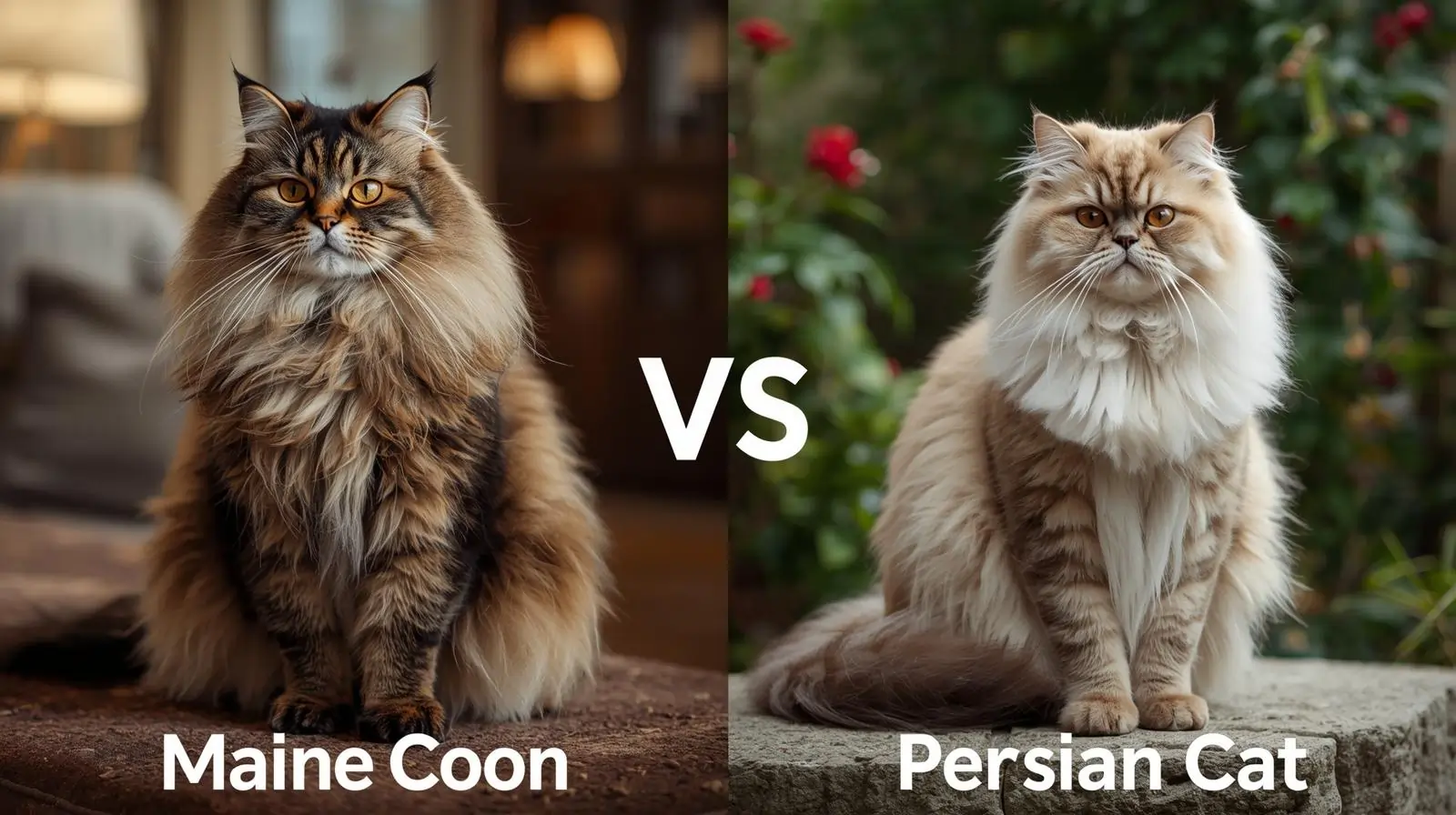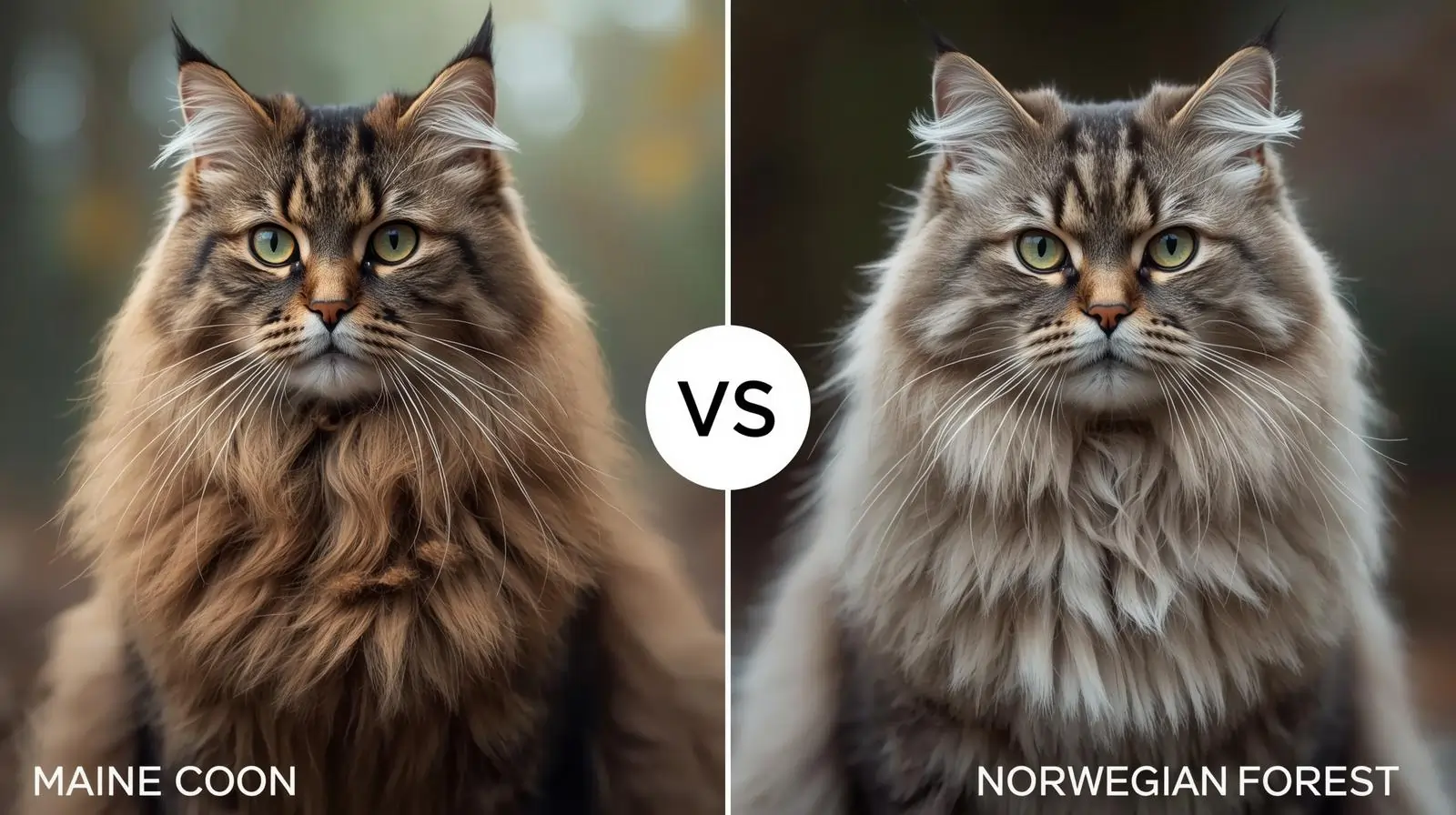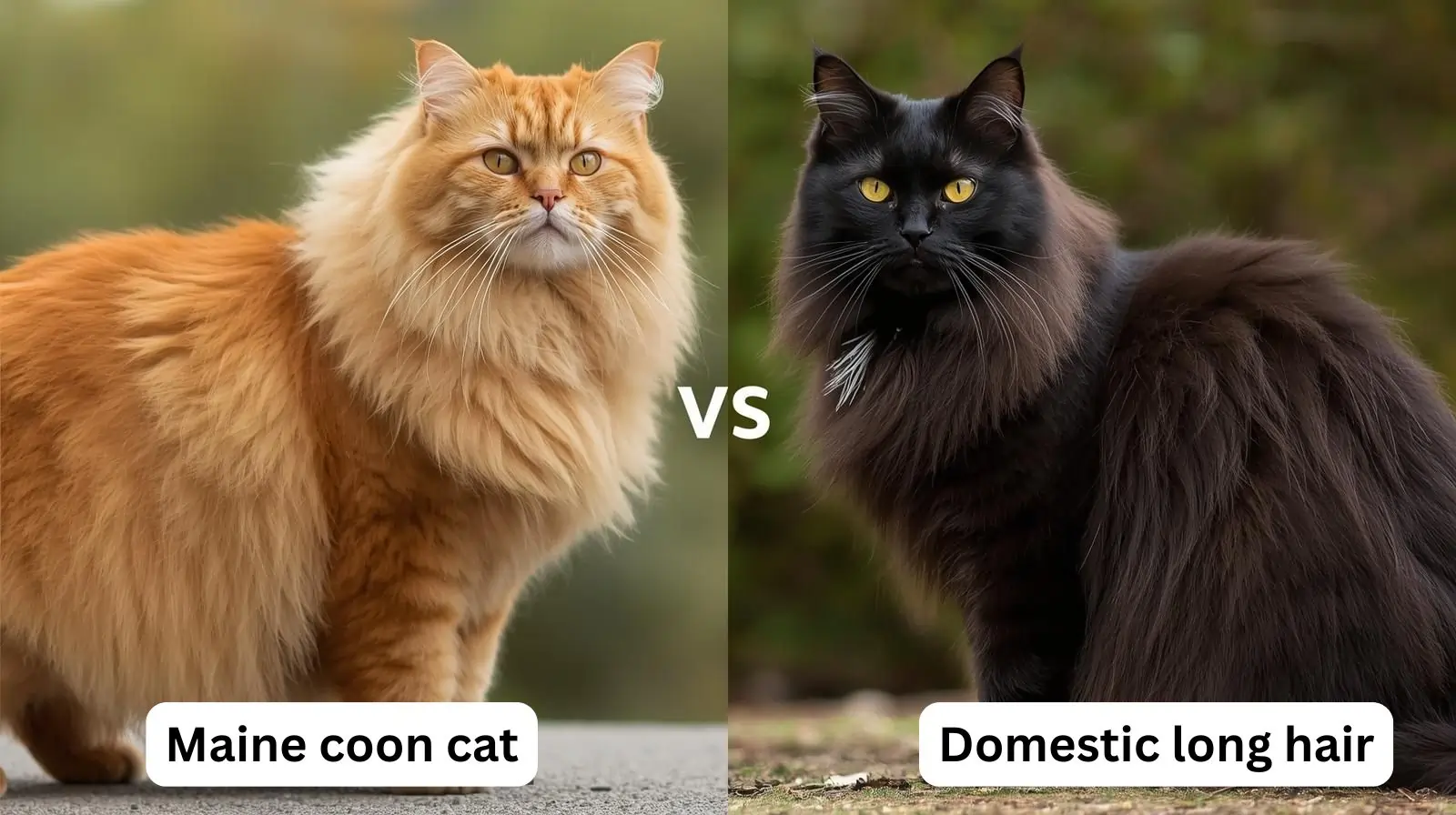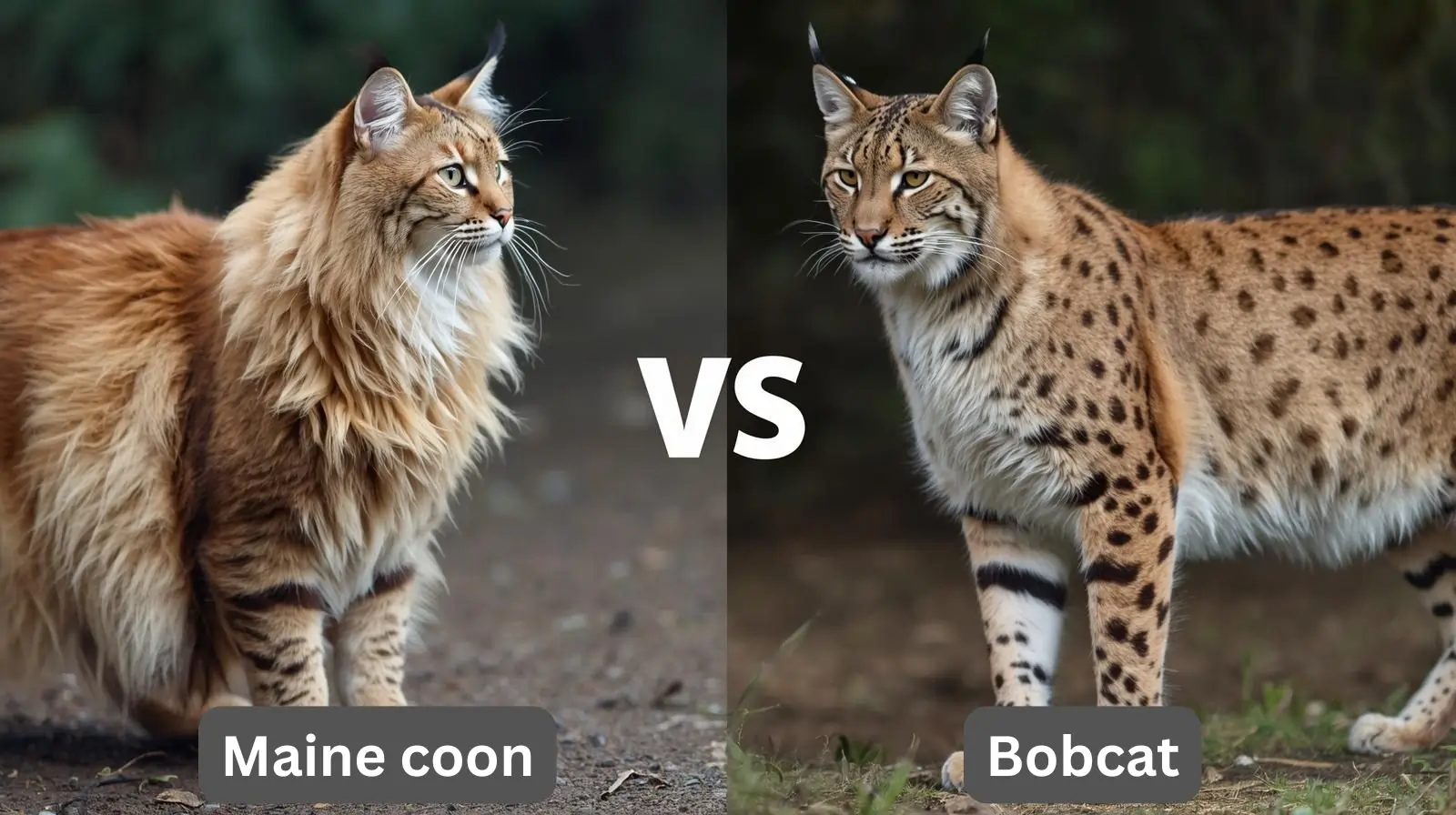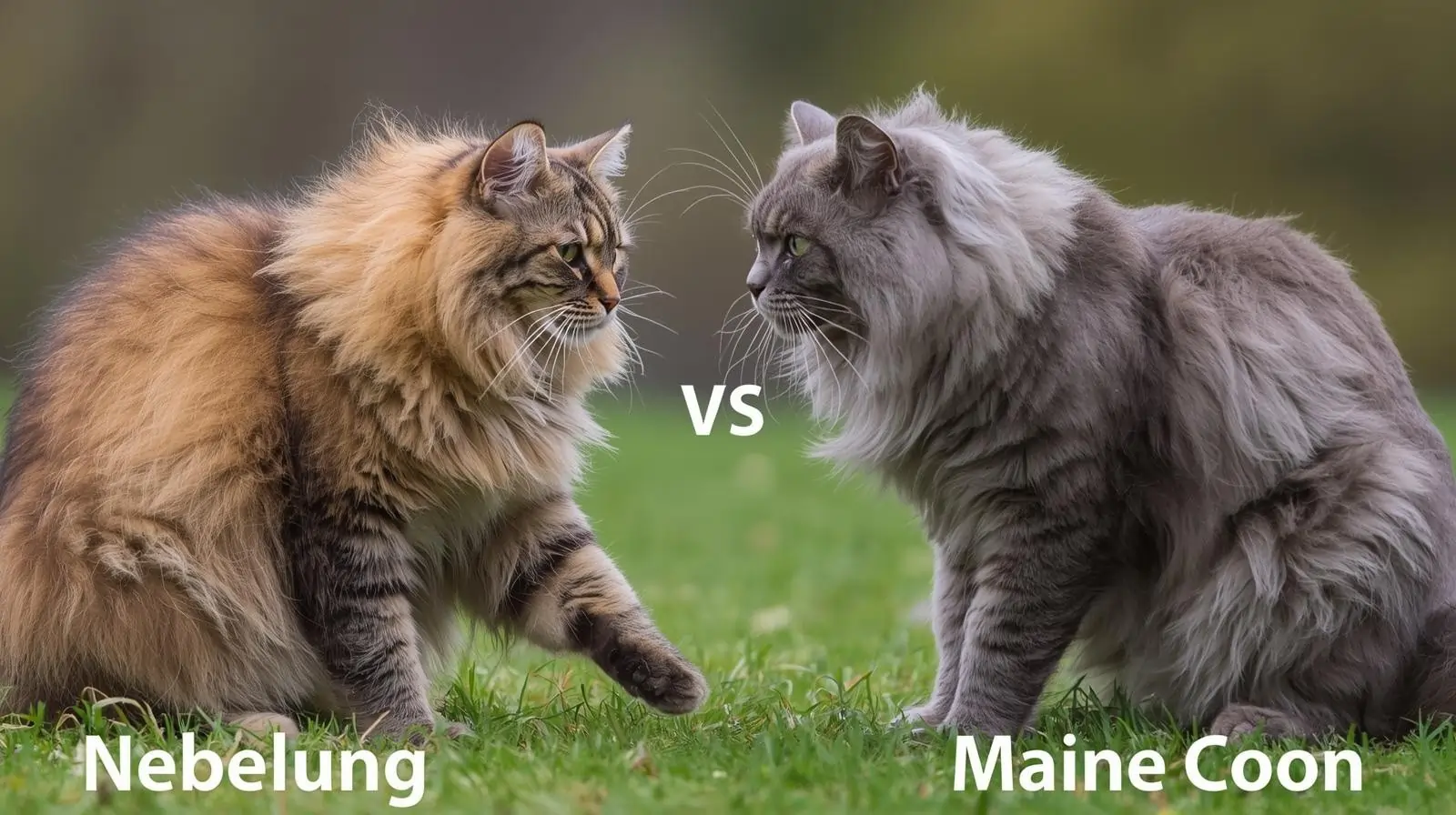Maine Coon vs Siamese: Which Cat Breed Suits You?
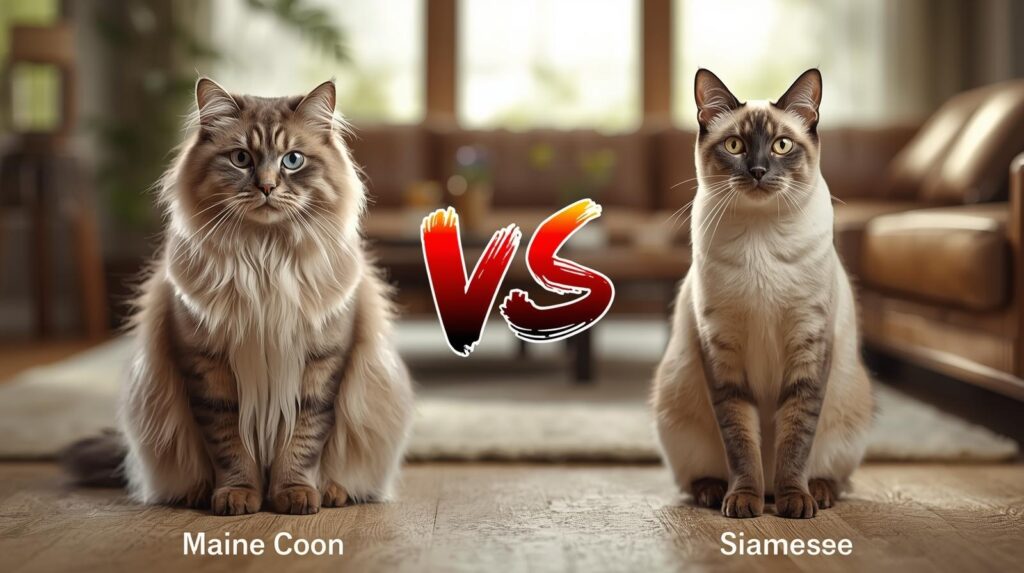
Choosing between a Maine Coon and Siamese cat can feel overwhelming when both breeds offer such distinct characteristics. As someone who has spent years observing and caring for various cat breeds, I’ve witnessed firsthand how these two popular felines captivate hearts in completely different ways. The Maine Coon vs Siamese debate represents one of the most fascinating comparisons in the feline world, contrasting America’s gentle giant with Thailand’s vocal aristocrat.
Physical Differences: Size and Appearance
How Big Are Maine Coon Cats?
The size difference in the Maine Coon vs Siamese comparison is immediately striking. Maine Coon males typically weigh between 18 to 22 pounds, while females range from 12 to 15 pounds. These magnificent creatures can reach impressive dimensions, with adults standing 10 to 16 inches tall and reaching maximum lengths of 40 inches, including their luxurious tails.
During my visits to Maine Coon breeders in New England, I’ve encountered males exceeding 25 pounds truly gentle giants that command attention simply by entering a room. Their substantial bone structure, rectangular body shape, and bushy tails contribute to their majestic presence.
Siamese Cat Physical Characteristics
Siamese cats present a completely different aesthetic in the Maine Coon vs Siamese discussion. Female Siamese typically weigh between 7.7 to 10.6 pounds, while males range from 9.9 to 12.1 pounds. Their sleek, muscular bodies create an elegant silhouette that contrasts sharply with the Maine Coon’s substantial frame.
Siamese cats feature distinctive colorpoint coats resulting from temperature-sensitive albinism, along with striking blue almond-shaped eyes, triangular head shapes, and large ears. This aristocratic appearance has captivated cat enthusiasts since the 19th century.
| Feature | Maine Coon | Siamese |
|---|---|---|
| Male Weight | 18–22 lbs | 9.9–12.1 lbs |
| Female Weight | 12–15 lbs | 7.7–10.6 lbs |
| Height | 10–16 inches | 8–10 inches |
| Body Type | Large, rectangular, muscular | Slender, elegant, tubular |
| Coat Length | Long, thick, water-resistant | Short, fine, glossy |
| Eye Color | Gold, green, copper | Deep blue |
Personality Traits: Maine Coon and Siamese
Maine Coon Temperament
The Maine Coon personality adds another dimension to the Maine Coon vs Siamese comparison. Despite their imposing size, Maine Coon cats are sweet-tempered and gentle, loving their families and adapting well to any environment. These cats are friendly, affectionate, and goofy, often behaving like pack animals and coming when called.
I remember visiting a family in Portland whose Maine Coon, named Thor, would greet visitors at the door, follow family members from room to room, and even play fetch behaviors more commonly associated with canines than felines. This dog-like loyalty makes them exceptional family pets.
Maine Coons often attach themselves to one person with dog-like loyalty, though they’re generally friendly and tactile rather than typical lapcats. Their playful nature persists well into adulthood, providing endless entertainment.
Siamese Cat Personality
When comparing Maine Coon vs Siamese personalities, Siamese cats bring intense vocal energy to the table. These cats are famously communicative, engaging their owners in lengthy conversations throughout the day. They’re highly intelligent, demanding attention and mental stimulation constantly.
Siamese cats form incredibly strong bonds with their human companions, often following them everywhere and insisting on participating in daily activities. They’re extroverted, social, and thrive on interaction making them less suitable for people who work long hours away from home.
During a consultation with a Siamese breeder in California, she emphasized that these cats literally vocalize their opinions about everything from meal times to perceived injustices, earning them the nickname “Meezer” for their distinctive meow.
Grooming Requirements and Maintenance
Maine Coon Grooming Needs
Grooming represents a significant consideration in the Maine Coon vs Siamese decision. Maine Coon cats require substantial maintenance due to their long, dense coats. Daily brushing prevents matting, reduces shedding, and maintains coat health. Their fur is water-resistant, featuring a silky texture that can tangle without proper care.
Regular grooming sessions become bonding opportunities, though they demand time commitment. Seasonal shedding intensifies grooming needs, particularly during spring and fall transitions. Nail trimming, ear cleaning, and dental care complete their maintenance routine.
Siamese Grooming Simplicity
The Siamese cat shines in this aspect of the Maine Coon vs Siamese comparison. Their short, fine coats require minimal maintenance—weekly brushing typically suffices to remove loose hair and distribute natural oils. This low-maintenance grooming routine appeals to busy professionals or first-time cat owners.
However, Siamese cats still benefit from regular nail trimming, ear checks, and dental hygiene. Their sleek coats naturally resist matting, making them considerably easier to maintain than their Maine Coon counterparts.
Health Considerations and Lifespan
Maine Coon Health Profile
Both breeds in the Maine Coon vs Siamese comparison face specific health vulnerabilities. Maine Coons are predisposed to hypertrophic cardiomyopathy (HCM), a heart condition affecting many large cat breeds. Hip dysplasia and spinal muscular atrophy also occur with increased frequency.
Regular veterinary check-ups, including cardiac screenings, help detect potential issues early. Maine Coons typically live 12-15 years with proper care, though some individuals reach their late teens.
Siamese Health and Longevity
Siamese cats enjoy impressive lifespans of 15-20 years, giving them an advantage in the Maine Coon vs Siamese longevity comparison. However, they’re prone to progressive retinal atrophy, respiratory issues, and dental problems.
Their sensitive respiratory systems make them vulnerable to upper respiratory infections. Maintaining proper dental hygiene becomes crucial, as Siamese cats frequently develop periodontal disease without preventative care.
Living Space and Environmental Needs
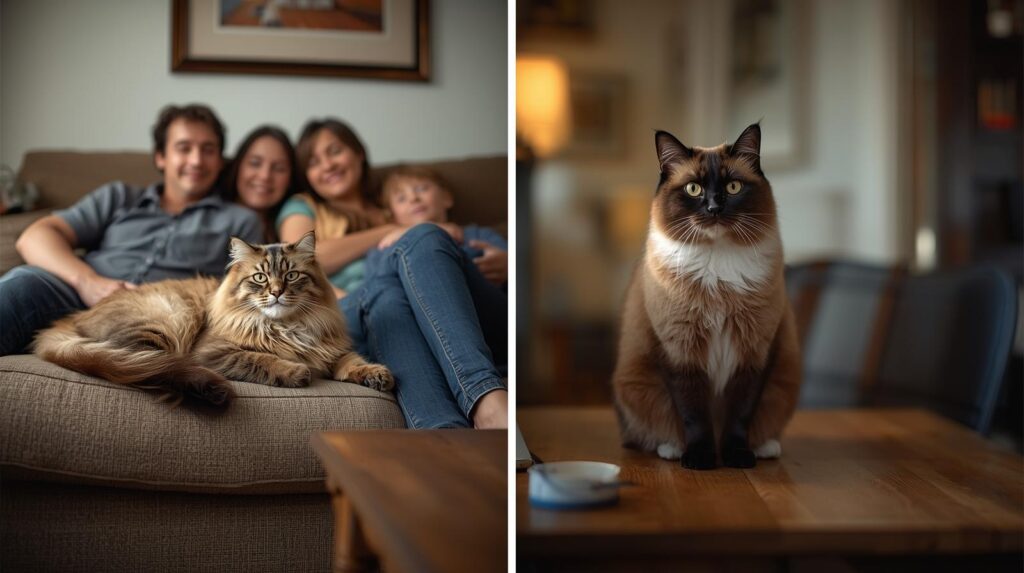
The Maine Coon vs Siamese debate extends to spatial requirements. Maine Coons need vertical space tall cat trees, sturdy shelves, and climbing opportunities accommodate their size and playful nature. They appreciate access to windows for bird watching and outdoor observation.
These gentle giants adapt remarkably well to various living situations, from apartments to houses, provided they have adequate exercise space. Their calm demeanor makes them excellent indoor companions.
Siamese cats require less physical space but demand more environmental enrichment. Interactive toys, puzzle feeders, and climbing structures keep their active minds engaged. They tolerate apartment living excellently but need stimulation to prevent destructive behaviors born from boredom.
Family Compatibility and Social Dynamics
Maine Coon with Children and Pets
Maine Coons generally get along with everyone, including well-behaved dogs, remaining calm and robust enough to handle typical family life while largely tolerating children. Their patient nature makes them ideal for households with young children who are learning appropriate pet interactions.
Their gentle disposition extends to other pets, making multi-pet households harmonious. I’ve observed Maine Coons peacefully coexisting with dogs, other cats, and even tolerating overly curious rabbits.
Siamese in Family Settings
The Maine Coon vs Siamese comparison reveals different family dynamics with Siamese cats. These felines prefer being the center of attention and may become jealous when sharing their humans with other pets or family members. They bond intensely but selectively.
Siamese cats suit families with older children who can appreciate their vocal nature and provide the constant interaction they crave. They may feel overwhelmed in chaotic households with very young children.
Cost Considerations and Availability
Maine Coon Investment
Acquiring a Maine Coon represents a significant financial commitment in the Maine Coon vs Siamese cost analysis. Reputable breeders charge $1,000-$2,000 for pet-quality kittens, while show-quality cats command premium prices exceeding $3,000.
Ongoing expenses include higher food costs due to their size, regular grooming supplies or professional grooming services, and potential health screenings. Their substantial size also means larger quantities of litter and more robust furniture to accommodate their weight.
For comprehensive information about this breed, check out these Maine coon Guides that provide detailed care instructions and breeding information.
Siamese Cat Expenses
Siamese cats typically cost $600-$1,200 from reputable breeders, positioning them as a more affordable option in the Maine Coon vs Siamese financial comparison. Their lower food consumption and minimal grooming needs reduce ongoing expenses.
However, their potential health issues, particularly dental care and respiratory treatments, may offset initial savings. Pet insurance becomes advisable for both breeds to manage unexpected veterinary costs.
Activity Levels and Exercise Requirements
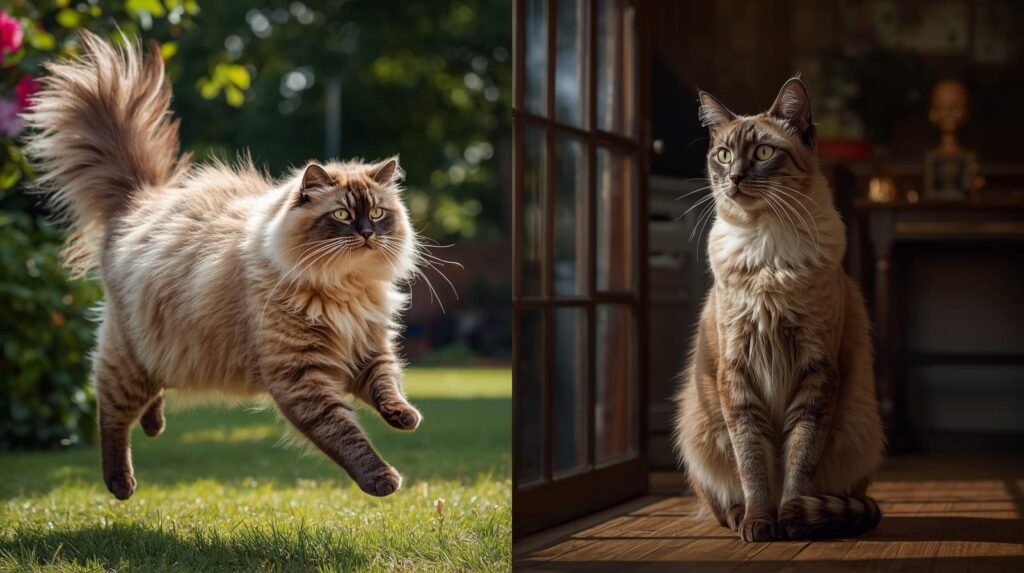
Maine Coons exhibit moderate activity levels, enjoying interactive play sessions but equally content lounging near their favorite humans. They appreciate water play unusual among cats and many enjoy supervised outdoor time in secure enclosures or on leashes.
Their hunting instincts remain strong, making feather toys and interactive games particularly engaging. Regular play prevents obesity, a concern for indoor Maine Coons given their large frames.
Siamese cats demand significantly more activity in the Maine Coon vs Siamese energy comparison. These athletic felines need multiple daily play sessions to burn excess energy and prevent behavioral issues. They excel at learning tricks, playing fetch, and solving puzzle toys.
Their intelligence requires constant mental stimulation; bored Siamese cats often develop destructive habits or excessive vocalization. They suit active owners who can dedicate time to interactive play and training.
Vocalization and Communication Styles
The Maine Coon vs Siamese vocal comparison reveals stark differences. Maine Coons typically communicate through soft chirps, trills, and gentle meows. They’re conversational without being overwhelming, often responding to their owners with pleasant vocalizations.
Their quieter nature suits apartment living and appeals to people preferring calmer companions. However, individual personalities vary, and some Maine Coons prove quite talkative.
Siamese cats are legendary for their vocal prowess. They possess loud, distinctive voices used frequently throughout the day to express opinions, demands, and desires. Their vocalizations can be startling for unprepared owners, resembling human baby cries in volume and urgency.
This trait makes them excellent companions for people who enjoy interactive relationships with their pets but potentially challenging for those seeking quieter households or living in noise-sensitive environments.
Training and Intelligence Comparison
Both breeds demonstrate impressive intelligence in the Maine Coon vs Siamese cognitive comparison, though they apply it differently. Maine Coons learn quickly, responding well to positive reinforcement training. Their dog-like behavior makes them amenable to leash training, fetch games, and even basic commands.
Their food motivation and desire to please their favorite humans facilitate training sessions. However, they maintain independent streaks typical of felines, training on their own schedules rather than their owners’.
Siamese cats showcase exceptional intelligence, often outsmarting their owners. They learn tricks rapidly, master puzzle toys quickly, and require constantly evolving challenges. Their problem-solving abilities mean they’ll discover how to open cabinets, doors, and containers housing treats.
This intelligence demands dedicated training and enrichment. Siamese cats need jobs whether that’s learning new tricks, navigating obstacle courses, or playing complex interactive games.
Which Breed Is Right for You?
The Maine Coon vs Siamese decision ultimately depends on your lifestyle, living situation, and personality preferences. Choose a Maine Coon if you want:
- A gentle, easy-going companion with dog-like loyalty
- A larger cat with impressive physical presence
- Moderate activity levels suitable for relaxed households
- A quieter cat that communicates without constant vocalization
- A patient family pet tolerant of children and other animals
Select a Siamese cat if you prefer:
- An intensely interactive, constantly communicative companion
- A sleek, elegant appearance with minimal grooming needs
- High intelligence requiring regular mental stimulation
- A vocal cat that “talks” throughout the day
- A devoted single-owner bond in a quieter household
Conclusion: Making Your Maine Coon vs Siamese Choice
Both Maine Coon and Siamese cats offer remarkable companionship, each appealing to different owner preferences and lifestyles. The Maine Coon vs Siamese comparison highlights how diverse feline personalities can be from the laid-back gentle giant to the demanding vocal aristocrat.
After spending years around both breeds, I’ve learned that neither is objectively “better” they simply suit different people. Maine Coons reward patience with loyal, gentle companionship, while Siamese cats provide intense interactive relationships that never leave you wondering what your cat is thinking.
Consider your daily schedule, living space, noise tolerance, and desired activity level when making this important decision. Visit breeders, meet adult cats of both breeds, and honestly assess your capabilities as a cat parent.
The perfect cat breed exists for everyone understanding your needs ensures you’ll find your ideal feline match, whether that’s a majestic Maine Coon or a vocal Siamese. For additional research on making the right choice, consult veterinary resources that provide evidence-based information about cat breeds and their specific requirements.
FAQs About Maine Coon vs Siamese Cats
Q: Can Maine Coon and Siamese cats live together?
A: Yes, Maine Coon and Siamese cats can coexist successfully with proper introductions. Maine Coons’ gentle nature typically accommodates the Siamese’s demanding personality, though the Siamese may initially dominate interactions. Gradual introduction and providing separate resources help establish harmony.
Q: Which breed sheds more, Maine Coon or Siamese?
A: Maine Coons shed significantly more than Siamese cats due to their long, dense double coats. Seasonal shedding intensifies during spring and fall, requiring daily brushing. Siamese cats shed minimally throughout the year, making them preferable for people concerned about pet hair.
Q: Are Maine Coons or Siamese better for first-time cat owners?
A: Siamese cats generally suit first-time owners better despite their demanding personalities, primarily because their grooming needs are minimal. However, their vocal nature and need for constant interaction may overwhelm some beginners. Maine Coons require more grooming expertise but offer easier-going temperaments.
Q: Do Maine Coon or Siamese cats have more health problems?
A: Both breeds face breed-specific health challenges. Maine Coons are prone to heart disease and joint issues, while Siamese cats experience respiratory problems and dental disease. Regular veterinary care and genetic testing help mitigate risks for both breeds.
Q: Which breed is more expensive to maintain long-term?
A: Maine Coons typically cost more to maintain due to higher food consumption, professional grooming expenses, and larger medication doses based on their size. Siamese cats require less food and grooming but may incur dental care and respiratory treatment costs, balancing overall expenses.
Q: Can you leave Maine Coon and Siamese cats alone during workdays?
A: Maine Coons tolerate solitude better than Siamese cats, managing 8-10 hour workdays with appropriate enrichment. Siamese cats struggle with extended alone time, potentially developing separation anxiety or destructive behaviors. A more independent breed may suit owners who work long hours away from home.

